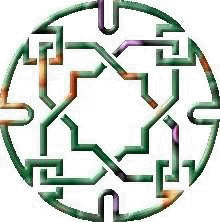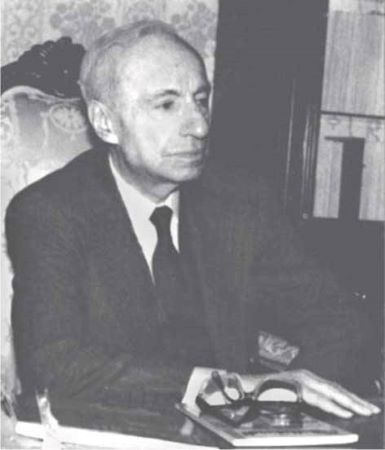



Michel Aflaq (1910-1989), the ideological founder of Ba’athism, a form of secular Arab nationalism.
Michel Aflaq was Born in Damascus to a middle class Greek Orthodox Christian family, Aflaq was first educated in the westernized schools of French mandate Syria, where he was considered a "brilliant student". He then went to university at the Sorbonne in Paris.
Upon returning to the Middle East, Aflaq became a school teacher and was active in political circles. In September 1940, after France's defeat in World War II, Michel Aflaq and Salah al-Din al-Bitar set up the nucleus of what was later to become the Ba’ath Party. The first conference of the Ba’ath Party (in full, the Arab Socialist Ba'ath Party), was to be in 1947.
In 1949, Aflaq served as Syria's education minister for a short period. In 1952, he left Syria, escaping from the new regime, returning two years later in 1954. Aflaq went on to play an important role in the achievement of the unity between Syria and Egypt in 1958.
Despite being co-founder of the Ba'ath party, Michel Aflaq had little connection to the government that took power in Syria under that name in 1963. Eventually, the government and he had a falling out and he was forced to flee to Iraq where another Ba’ath Party had taken power. While this party also failed to follow most of ‘Aflaq's teachings, he became a symbol for the regime of Saddam Hussein according to whom Iraq was in fact the true Ba’athist country. In Iraq he was given a token position as head of the party and his objections to the regime were silenced and ignored.
During the period of study in Sorbonne he first developed his Arab nationalist ideals, eventually attempting to combine socialism with the vision of a Pan-Arab nation. In his political pursuits, Aflaq became committed to Arab unity and the freeing of the Middle East from Western colonialism.
In his writings Aflaq had been stridently in favor of free speech and other human rights and aid for the lower classes. He stated that the Arab nationalist state that would be created should be a democracy. These ideals were never put in place by the regimes that used his ideology. Most scholars see the Assad regime in Syria and Saddam's regime in Iraq to have only employed Aflaq's ideology as a pretense for dictatorship.
"A day will come when the nationalists will find themselves the only defenders of Islam. They will have to give a special meaning to it if they want the Arab nation to have a good reason for survival." (In memory of the Arab Prophet, 1 April, 1943).
"The connection of Islam to Arabism is not, therefore, similar to that of any religion to any nationalism. The Arab Christians, when their nationalism is fully awakened and when they restore their genuine character, will recognize that Islam for them is nationalist education in which they have to be absorbed in order to understand and love it to the extent that they become concerned about Islam as about the most precious thing in their Arabism. If the actual reality is still far from this wish, the new generation of Arab Christians has a task which it should perform with daring and detachment, sacrificing for it their pride and benefits, for there is nothing that equals Arabism and the honor of belonging to it." (In memory of the Arab Prophet -April, 1943)